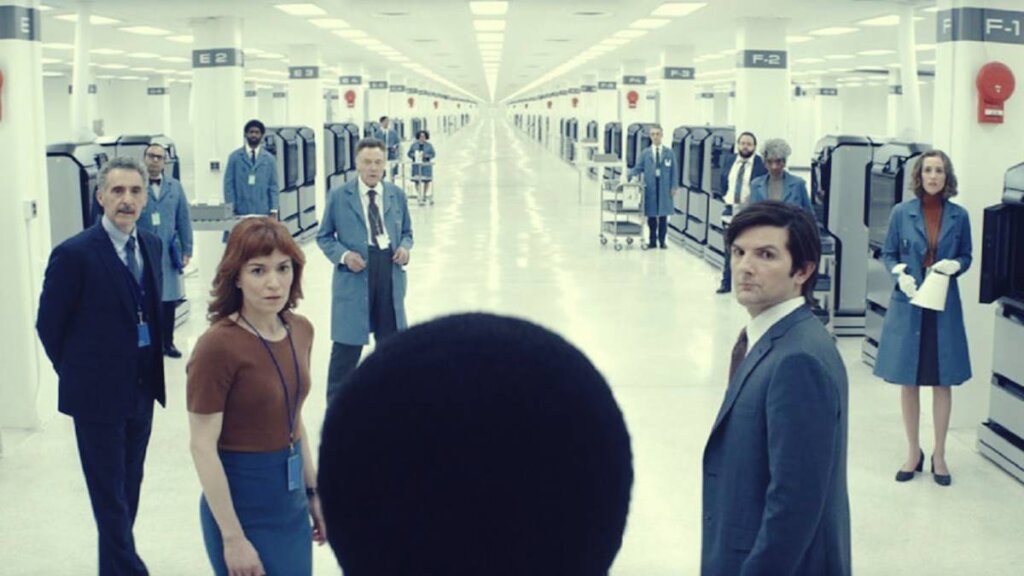Severance: Work in Exchange for Mental Submission


Written and verified by the psychologist Valeria Sabater
To be able to completely separate your personal self from your work self might sound tempting. However, the idea is so Kafkaesque that it’s also rather chilling. Nevertheless, this is precisely what happens in the successful tv series, Severance. It’s directed by none other than Ben Stiller.
This dystopian scenario couldn’t have appeared at a more opportune moment. Indeed, in these post-pandemic times, TV shows in the purest George Orwell style are always welcome. The script introduces us to the enigmatic company, Lumon Industries. Anyone who wishes to work there must undergo a unique surgical intervention.
In fact, each employee has to give permission to have a chip inserted to separate their work selves (innies) from their home selves (outies). The objective -apparently- is to achieve the perfect balance between the personal and the professional. The bosses want to achieve harmony in the workplace by erasing the employees’ memories every day when they enter and leave the company.
Lumon Industries evokes an aseptic hospital environment, with long and creepy white corridors and minimalist rooms, in which the most unlikely tasks are carried out. The series is a metaphor for the wickedness of a part of our current labor market. Microworlds, in which the human being is subjected, erased, suffocated, and manipulated.
“We’re people not parts of people. Even with what little they gave us these are our lives. No one gets to just turn you off.”
–Severance–

Severance and the dark side of corporate culture
The series introduces us to four workers in the Macrodata Refinement Department of Lumon Industries. As we mentioned earlier, this corporation has developed a sophisticated process with which to separate the work life of an employee from their personal life. Therefore, the anxieties and burdens that each employee brings from home every day remain at the door of the organization.
By the time they get in the elevator, the erasure and transition from one sphere to the other have already taken place. This can actually be a relief, an escape strategy from life’s problems. One example is Mark Scout, one of the data entry assistants who’s lost his wife. For him, it seems to be beneficial to spend a portion of his day away from the pain of his grief. Or at least, that’s what he initially believed.
The working day unfolds methodically in a room with four cubicles in which are two desks, retro-futuristic computers, and chairs. It’s here where the four protagonists work, who can’t interact with other departments and don’t even know how many more employees there are in the company.
The series is a dark metaphor for how some mega-corporations treat their employees.
Employees trapped in a vigilant and controlling environment
All of the members of the Macrodata Refinement Department exhibit conformist personalities, except for the new employee, Helly. From her first day, this rebellious young woman tries to write notes for her external self to resign from the job. However, every desperate effort to escape from the scenario – including suicide – is effectively prevented.
It’s easy to sense that something sinister is hiding in Lumon Industries. The most obvious clue is when Mark’s external self meets Petey. This individual claims to be his best friend at work and to have been ‘reintegrated’. That’s to say, his two personalities have come together. This allows him to remember everything that’s happening in the great and mysterious corporation.
Gradually, the conformist, methodical, and obedient Mark awakens and begins to take an interest in the reintegration process. He starts to realize that, perhaps having given in to separating his personal life from his work life hasn’t been the solution to his suffering after all. In fact, it seems to be further darkening his existence and obscuring certain truths.
“The surest way to tame a prisoner is to make him believe he’s free.”
-Severance-
The denunciation of labor slavery in Severance
Severance brings us a sinister metaphor about how the almighty mega-corporations oppress and dominate their employees. Lumon Industries is like Amazon run by evil Scientologists. In this case, by a terrifying Patricia Arquette who’s revered almost as a religious entity.
The series immerses us in a sad and toxic work environment that evokes a never-ending kind of Western capitalism. In fact, the dystopian microworld in which the protagonists move is really familiar to us. There are the internal quarrels, the unexpected alliances between colleagues, the group dynamics, the work for incentives, and even a passionate defense for unionization.
The coldest corporate culture deconstructs people and creates these dystopian situations that invite denunciation and reflection. It also poses the eternal question of whether we live to work or work to live.
The compassionate embrace toward the workers
For many years, tv-series have been made about successful personalities. One such example was Suits, but there have been many others in which the CEO’s perspective is highlighted. Those who triumph and are at the top. However, Severance goes down the ladder and embraces the figures of the low-ranking employees.
Like worker bees, the employees subsist in a company where there are wax statues of each CEO. The series suggests that these workers will never reach those top positions. Firstly, because they’re too busy working. Secondly, it’s better not to be like them. In that way, they’ll avoid unethical, Machiavellian, and unhuman-like decisions.
This text is provided for informational purposes only and does not replace consultation with a professional. If in doubt, consult your specialist.








